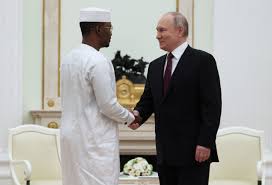
Chad, a long-standing French ally, is strategically navigating relationships with Russia and its traditional Western partners, creating tension for Paris and Washington. President Mahamat Déby’s recent visit to Moscow and Russian Foreign Minister Sergei Lavrov’s trip to N’Djamena signal strengthening ties, primarily in cultural and media spheres.
This shift unsettles Western allies, particularly France, which maintains a significant military presence in Chad. The United States, having recently returned its special forces to Chad after a brief departure, also closely monitors the situation. Chad’s strategic location bordering Sudan, Libya, and the Central African Republic makes it crucial for regional stability.
Chad’s flirtation with Russia comes amid broader regional trends, with Mali, Burkina Faso, and Niger having expelled Western forces in favor of Russian support. However, Chad’s approach appears more nuanced, leveraging Russian relations to gain leverage with Western partners rather than seeking a complete pivot.
Déby’s regime faces its own challenges, including criticism over his recent election and ongoing French judicial probes into potential corruption. Despite these tensions, Chad’s relationships with Western allies remain intact, with Paris and Washington hoping that Chad views Russia as a diplomatic add-on rather than an alternative to Western partnerships.
The opening of an official Russian cultural center in N’Djamena and the brief detention of individuals linked to the former Wagner security outfit highlight the complex dynamics at play. Chad’s balancing act reflects the changing geopolitical landscape in Africa, where countries increasingly seek to diversify their international partnerships while managing longstanding alliances.
